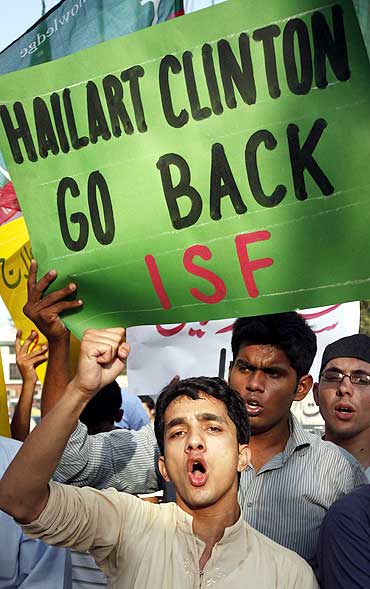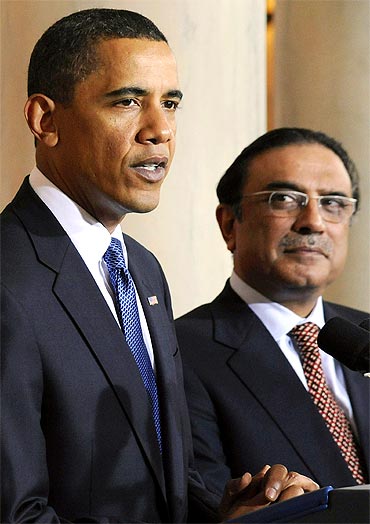Will Pakistan Army revolt against Kayani?
Last updated on: June 18, 2011 10:54 IST
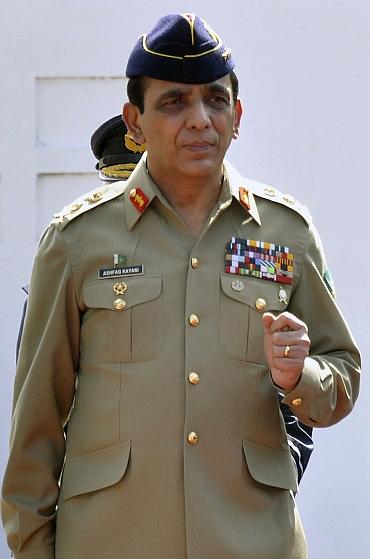
Following the death of Al Qaeda leader Osama bin Laden, criticism of Pakistan Army Chief inside the country has grown. His close ties with the Barack Obama administration has not gone down with the army. But will Pakistan's most powerful man be overthrown?
Can there be a revolt against General Ashfaq Pervez Kayani, Pakistan's Chief of the Army Staff, either by the subalterns or by senior officers due to their unhappiness over his alleged amenability to pressure from the United States?
There has been an interesting and exciting debate on this question in the wake of the publication of a recent report by the New York Times on this subject.
Anti-US anger in Pakistan -- in the streets as well as in the barracks -- is nothing new. It has always been there right from the 1950s when Pakistan joined the US-sponsored regional military pacts.
Pakistani leaders -- civil as well as military -- had given a free play to this anger in order to extract more assistance from the US without letting this feeling of discontent become uncontrollable. Using anti-US anger without letting themselves be burnt by it -- this has become a fine art in Pakistan.
Click NEXT to read further...
Anti-US anger in Pak fuelled post Osama's death
Last updated on: June 18, 2011 10:54 IST
The anti-US anger being seen in Pakistan since the beginning of this year due to the surge in the US drone strikes in the tribal areas, the increase in the presence of US intelligence officers and special forces commandos in Pakistani territory and the unilateral and clandestine raid by the US Naval commandos at the residence of Osama bin Laden at Abbottabad on May 2 is not a new phenomenon.
It is a re-enactment of an old phenomenon.The only thing new this time is that this anger has been accompanied by feelings of humiliation in the public as well as in the barracks over the perceived disregard by the US of Pakistani sensitivities relating to the repeated violations of its sovereignty.
Pak leaders have no qualms over being used by US
Last updated on: June 18, 2011 10:54 IST
Pakistani leaders have never had any qualms over letting themselves be used by the US in a manner designed to serve their interests, provided the payment for such use was adequate. They had let themselves be used by the US for its U-2 flights over the Union of Soviet Socialist Republics.
They had let themselves be used by the US for monitoring Chinese nuclear tests in Lop Nor. They had let themselves be used by the US against the Soviet troops in Afghanistan in the 1980s. They are letting themselves be used by the US in the post-9/11 war against terrorism emanating from the Af-Pak region.
Fears of public anger never inhibited the actions of the Pakistani military leadership in entering into a quid pro quo relationship with the US provided the compensation and benefit to Pakistan were adequate.
Musharraf more sensitive to US interests than Kayani
Last updated on: June 18, 2011 10:54 IST
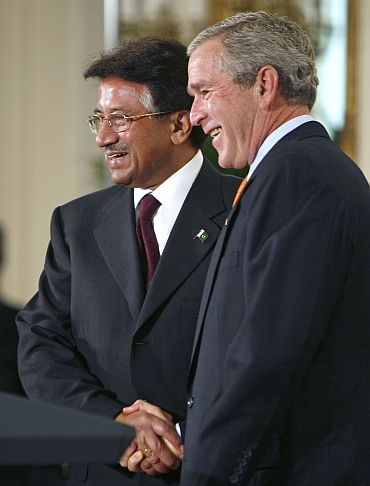
What is worrying the Pakistani military leadership this time are the feelings of national humiliation caused partly by the unilateral nature of some of the US decisions and operations. The frequency of such unilateral decisions and actions by the US has been dictated by the growing distrust of Pakistan's sincerity in counter-terrorism.
Former Pakistan president General Pervez Musharraf was more sensitive to the US interests and more accommodating to US demands than Kayani. He readily agreed -- without ever dragging his feet -- to many of the requests that emanated from the George Bush administration.
He transferred senior lieutenant generals and a chief of the Inter-Services Intelligence because the US viewed them with suspicion as close to the Afghan Taliban. He allowed the US Air Force to use Pakistani bases in Balochistan for mounting rescue operations in Afghanistan, and permitted an immense increase in the US intelligence presence in Pakistani territory.
Musharraf agreed to the US intelligence and investigating officers accompanying joint teams of the Inter-Services Intelligence and the police when they raided suspected hideouts of Al Qaeda operatives in places such as Faislabad, Karachi and Rawalpindi. He enforced restrictions on the admission of foreign students in the madrasas and allowed the movement of logistic supplies to the North Atlantic Treaty Organisation troops in Afghanistan through Pakistani territory.
Musharraf's actions angered the lower-rung cadres
Last updated on: June 18, 2011 10:54 IST
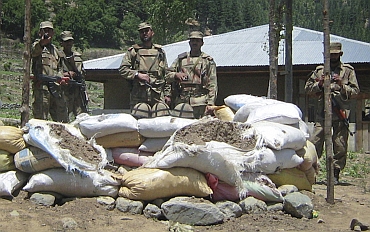
The former Pakistan president facilitated the interrogation of two retired senior Pakistani nuclear scientists by the US. He placed AQ Khan, the so-called father of Pakistan's atomic bomb, under house arrest after the discovery of his proliferation activities by the US.
He ordered his intelligence and investigating agencies to informally hand over hundreds of terrorism suspects to the US for rendition and interrogation in the Guantanamo Bay detention centre and other places without following the due process of the law.
These actions of Musharraf caused anger at the lower levels of the Pakistani armed forces, which triggered off three unsuccessful attempts to kill him -- once in Karachi through an explosive device, which malfunctioned and twice in Rawalpindi through commando-style ambushes that failed.
But the anger at the lower levels in the barracks was kept under control by the commissioned officers and core commanders who remained loyal to Musharraf despite whatever misgivings they might have had in their mind about the wisdom of his unreserved co-operation with the US.
Even senior lieutenant generals whose promotion chances were stymied by Musharraf's continuing to hold the post of the chief of the army staff, never wavered in their loyalty to him.
Doubtful that Kayani would be overthrown by his officers
Last updated on: June 18, 2011 10:54 IST
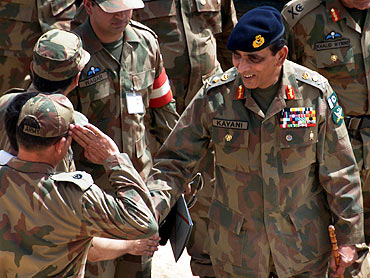
A chief is a chief right or wrong for most in the Pakistan Army. There have been plots in the past, but these plots failed because of the failure of the plotters to enlist widespread support against the chief. Have things become different under Kayani? I find it difficult to accept this on the basis of the currently available information.
Yes, Kayani co-operated with the US, but not as extensively as Musharraf did. Yes, there is anger against Kayani at the lower levels, but he has never been the target of a serious assassination attempt as Musharraf repeatedly was. Yes, there is a feeling of humiliation in the army as there never was when Musharraf was the chief, but there are no signs that this humiliation has reached a critical point or could do so.
Yes, Kayani could face threats of assassination, but could he face the threat of being overthrown by his own officers? I am doubtful in my mind for the present. We should resist the urge to over-assess Pakistan -- positively or negatively.

